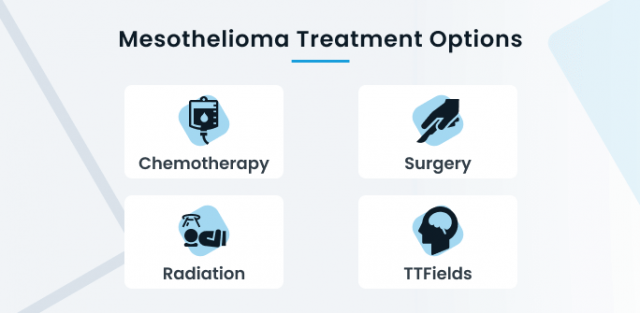Is There a Cure for Mesothelioma?
There is currently no cure for malignant mesothelioma. Because mesothelioma is so rare, it receives significantly less research funding than other forms of cancer. About 3,000 cases of mesothelioma, including pleural mesothelioma, are diagnosed each year, compared with about 228,000 lung cancer cases annually.
However, researchers and doctors remain optimistic. Advancements in conventional mesothelioma treatment options such as surgery, chemotherapy and radiation therapy and in emerging treatments such as immunotherapy and gene therapy have shown signs of increased survival rates for patients. There are also more clinical trials with promising results, creating hope for improved treatment options for mesothelioma patients in the future.
Mesothelioma Treatment Advances

Although there is no cure for pleural mesothelioma, treatment options may improve a patient’s life expectancy, either by a few months or a few years.
Chemotherapy for Mesothelioma
Chemotherapy for mesothelioma has improved over the years. Some chemotherapy drugs can directly target cancerous cells while minimizing harmful effects to healthy cells in the body. Chemo is also more precise than in the past and can potentially stop or slow the growth of any cancerous cells left behind after surgery.
Chemotherapy may be most effective when more than one drug is used, such as the combination of Alimta, also known as pemetrexed, and cisplatin. This drug combination is the most common and often the most effective to treat pleural mesothelioma.
Radiation Therapy for Mesothelioma
Radiation therapy for mesothelioma has also improved dramatically in the past few decades. Advances include better precision, dosages personalized for each patient, increased dosage, continuous imaging guidance and improved computer-assisted planning. Radiologists can now administer more effective and safer radiation doses in a shorter period of time.
Surgery for Mesothelioma
Potentially curative surgeries, such as a pleurectomy (removal of the pleura) and an extrapleural pneumonectomy (removal of the lung and pleura), can now remove all visible mesothelioma cancerous cells.
Multimodal Therapy
Perhaps the most effective and most improved type of therapy for pleural mesothelioma patients is the multimodal therapy approach. Multimodal therapy is the combination of two or more treatment options to more aggressively treat the cancer. This type of treatment is becoming more popular and has proven successful in many patients.
Tumor Treating Fields (TTFields)
Tumor Treating Fields for mesothelioma uses alternating electrical currents to disrupt cancer cell growth. Doctors prescribe TTFields alongside chemotherapy, and patients receive a portable device that delivers treatment through wearable adhesive patches. The therapy is painless and can shrink tumors or prevent new growth.
Immunotherapy and Gene Therapy for Mesothelioma
Mesothelioma doctors are also moving forward with immunotherapy and gene therapy in clinical trials to help improve patients’ prognoses. Immunotherapy uses a patient’s immune system to help fight the mesothelioma cancer cells in the body without harming healthy cells.
Gene therapy involves infecting a patient with a genetically altered virus that replaces the defective copy of the same gene, allowing it to kill cancer cells and slow tumor growth.

The Importance of Early Detection
To detect pleural mesothelioma in its early stages is difficult, because of the aggressive nature of the cancer and the fact that early symptoms often mimic less severe respiratory conditions, which may lead to an initial misdiagnosis.
Although early diagnosis is difficult, it is the biggest key to an improved prognosis. An early diagnosis can mean more treatment options, including more aggressive and experimental treatments. In addition, treatment is often more effective when mesothelioma is diagnosed in an early stage.
Historically, tissue biopsies and imaging tests were necessary to make a definitive pleural mesothelioma diagnosis, but recent improvements in blood-based biomarkers have shown promising results. Clinical trials are also paving the way for easier early diagnosis using breath and urine samples. Other less invasive diagnostic tests may also help doctors diagnose pleural mesothelioma earlier.
Pleural Mesothelioma Clinical Trials

Patients across the country participate in a number of mesothelioma clinical trials that aim to take advantage of new, cutting-edge technology to develop better treatment options and help advance the search for a cure. The next major advancements in mesothelioma treatment will likely come from a clinical trial.
The clinical trial that led to the FDA approval of Tumor Treating Fields prolonged mesothelioma patient survival by over six months. The treatment delivers alternating electrical fields that limit cancer growth. It is now available to more pleural mesothelioma patients, thanks to its success in clinical trials.
Since no pleural mesothelioma cure has yet been discovered, clinical trials evaluate experimental treatment options and allow patients to try medications and procedures that have not yet been approved by the Food and Drug Administration (FDA). Anyone interested in clinical trials should speak to their doctor first about their eligibility.
Researchers and specialists across the country will continue their tireless work – mostly through clinical trials – until the day we have a cure for pleural mesothelioma.
Mesothelioma Cure FAQ
- Is mesothelioma cancer curable?
-
There is no known cure for mesothelioma. Early diagnosis and aggressive treatment helps some patients live for years with the cancer. The search for a cure is underway in mesothelioma clinical trials.
- What emerging treatments are available for mesothelioma?
-
The U.S. Food and Drug Administration approved a new therapy for pleural mesothelioma in 2019. Known as Tumor Treating Fields, it uses alternating electrical fields to slow the growth and spread of mesothelioma. Other emerging treatments, including immunotherapy and photodynamic therapy, are available through clinical trials.
- Can mesothelioma go into remission?
-
Mesothelioma can go into remission on its own or with the help of anti-cancer treatment. It is extremely rare for mesothelioma to enter remission on its own, but a handful of cases have been reported. Treatments such as chemotherapy, surgery, radiation and Tumor Treating Fields can send mesothelioma into temporary remission.
- How do I enroll in a clinical trial?
-
Many patients enroll in a mesothelioma clinical trial through their doctor, who is familiar with the local clinical trials they will qualify for. Some patients seek a second opinion from a mesothelioma specialist at another cancer center to see what other trials they may be able to access.


